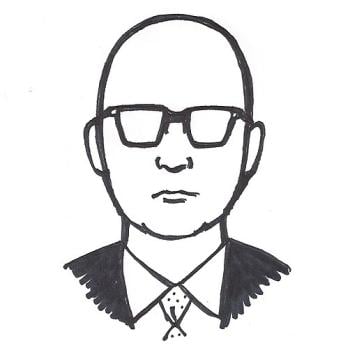Editors' Note: This article is part of the Patheos Public Square on Sacrifice: Religions and the Role of the Scapegoat. Read other perspectives here.
"I will take the Ring… though I do not know the way." One of the most courageous lines in literature is spoken by a humble Hobbit. Frodo has already endured much terror to save his homeland from those seeking the Ring. He willingly left the people and place he loved, sacrificing his well-being for the sake of others' flourishing. The sacrifice was immense for him as a Shire-loving Hobbit. He thought his job was finished, having transported the Ring from the Shire to Rivendell, where he thought it would be safe. Upon learning that the only safety lay in carrying the Ring into the heart of enemy territory, up Mount Doom, and casting it in the fire, he offers himself for the task. This is sacrifice as "wonderful exchange," "my life for yours" in self-giving love.
As a Catholic, Tolkien's understanding of sacrifice was deeply rooted in biblical understanding. Katallasso is the Greek word for reconciliation in the New Testament, and it literally means "exchange." Relationships among people and creation are restored through a sacrificial exchange — offering one's own life that others may live and indeed flourish. Good overcomes evil through the revolutionary means of love offered for hate, forgiveness for condemnation, and life for death.
One can see this view of sacrifice as a vehicle of liberation and healing throughout the narratives of J.R.R. Tolkien, C.S. Lewis, and Charles Williams. In Tolkien, Frodo's self-offering becomes a kind of via dolorosa as he labors with the crushing weight of the Ring up Mount Doom. Gandalf the Grey courageously offers himself for the Fellowship of the Nine when pursued by the Balrog, and though he perishes, the others are liberated to continue on their perilous journey. Such sacrifice leads to more life, and thus he is resurrected and returns as Gandalf the White. Aragorn walks through the Paths of the Dead in a way that fulfills prophecy and leads toward the lifting of a curse brought against them because of their betrayal.
The three expressions of sacrifice exemplified by Frodo, Gandalf, and Aragorn offer "splintered fragments of the true light": Jesus' own sacrificial roles of priest, prophet, and king. Even so, Jesus' atoning life and death were the means by which God defeated evil and offered a wonderful exchange, bearing the curse of death and destruction that we might have life and liberation. Even as the atonement biblically is the means to at-one-ment, breaking down the barriers between Jew, Gentile, slave, free, male and female (Gal. 3:28), for Tolkien, the sacrifices of Frodo, Gandalf, Aragorn, and others help to remove the barriers between people, dwarves, elves, hobbits, wizards, male, female, and the created order. This is the means by which destructive and divisive ways of evil are defeated and relationships are restored.
For Charles Williams also, the sacrificial pattern of wonderful exchange is woven into the fabric of the universe. He referred to it as "co-inherence." Even as the Father, Son, and Spirit live in the eternal co-inherence of self-giving love, the created order is meant to participate in that life and overflow with that kind of love. The gift of the divine self in the life, death, and resurrection of Christ makes such participation possible. We may participate in such divine love daily by bearing each other's burdens, sharing in each other's worries, fears, and even physical ailments. Pauline, in Williams' Descent into Hell, ultimately chooses to live the truth of co-inherence and thus, in this "perpetual exchange," and "terrible good," discovers freedom from all that haunts her and the ability to love both her neighbor and her enemy.
The wonderful exchange is evident in Lewis's writing as well. Aslan, the Christ-figure, lays down his life in exchange for Edmund's betrayal. Those who serve Aslan, whether Lucy, Puddleglum, Reepicheep, or Digory, offer their lives to free others. In this way Lewis portrays what it looks like to participate in "the Christ-life" in us (C.S. Lewis, Mere Christianity).
Jesus in Lewis's Great Divorce is called "the Bleeding Charity." His nature is reflected even in the waterfall, that "stood like one crucified, against the rocks and poured himself perpetually down towards the forest with loud joy." "Glory flows into everyone, and back from everyone: like light and mirrors."
Just as Jesus is the revelation of the nature of God, even so Aslan reveals the nature of his father, "the Emperor-Over-the Sea," who would never abandon his beloved son to death (Lewis, The Chronicles of Narnia). It is clear with Aslan, as with Jesus, that sacrificial death is a way of expressing rather than earning the forgiveness and love of the Father. And its impact is meant to be transformative. Edmund becomes self-giving rather than addictively selfish through receiving Aslan's sacrifice for him, like life-less statues warmed to new life by Aslan's breath. Lewis portrays something of the ontologically transformative nature of Jesus' sacrifice when Eustace submits his dragon self to Aslan and by Aslan's blood is able to become a new creation and participate in divine life.




